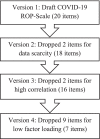Validation of Responsiveness of Physicians Scale (ROP-Scale) for hospitalised COVID-19 patients in Bangladesh
- PMID: 35971120
- PMCID: PMC9376893
- DOI: 10.1186/s12913-022-08413-4
Validation of Responsiveness of Physicians Scale (ROP-Scale) for hospitalised COVID-19 patients in Bangladesh
Abstract
Background: Responsiveness of Physicians (ROP) is defined as the social actions by physicians aimed at meeting the legitimate expectations of healthcare users. Even though patients' expectations regarding ROP have increased during the COVID-19 pandemic, the psychometrically-validated ROP-Scale is difficult to apply in hospital settings. The goal of this study is to validate the existing ROP-Scale to measure the responsiveness of hospital physicians during the ongoing COVID-19 pandemic in Bangladesh.
Methods: We conducted a cross-sectional phone survey involving 213 COVID-19 hospital patients, randomly selected from the government database. We applied the Delphi method for content validity, exploratory and confirmatory factor analyses for construct validity, Cronbach's alpha and corrected item-total correlation for internal consistency reliability, and Pearson's correlation between the scale and overall patient satisfaction for concurrent validity.
Results: After removing survey items based on data sufficiency, collinearity, factor loading derived through exploratory factor analysis, and internal consistency, the final version of the COVID-19 ROP-Scale consisted of 7 items, grouped under Informativeness, Trustworthiness and Courteousness domains. The confirmatory factor analysis supported the three domains with acceptable model fit [Root mean squared error of approximation (RMSEA) = 0.028, Comparative fit index (CFI) = 0.997, Tucker-Lewis index (TLI) = 0.994)]. The corrected item-total correlation ranged between 0.45 and 0.71. Concurrent validity was ascertained by the high correlation (0.84) between patient satisfaction and the COVID-19 ROP-Scale. Based on the mean domain score, the highest- and the lowest-scoring responsiveness domains were 'Trustworthiness' (7.85) and 'Informativeness' (7.28), respectively, whereas the highest- and the lowest-scoring items were 'Not being involved in illegal activities' (7.97), and 'Service-oriented, not business-like attitude' (6.63), respectively.
Conclusions: The 7-item COVID-19 ROP-Scale was demonstrated to be feasible, valid, and internally consistent. Therefore, its application can help amend past mistakes in health service provision and improve care for the hospitalised COVID-19 patients or other patients suffering from similar conditions. This study can contribute to the national decision-making regarding hospital care, open up further avenues in the health policy and system research, and eventually improve the quality of care provided to Bangladeshi patients seeking hospital services. Moreover, findings yielded by this study can be incorporated into doctors' medical education and in-service training.
Keywords: Bangladesh; Patient satisfaction; Psychometric evaluation; Responsiveness of physicians; Scale validation.
© 2022. The Author(s).
Conflict of interest statement
The authors declare that they have no competing interests.
Figures



Similar articles
-
Development and validation of a structured observation scale to measure responsiveness of physicians in rural Bangladesh.BMC Health Serv Res. 2017 Nov 21;17(1):753. doi: 10.1186/s12913-017-2722-1. BMC Health Serv Res. 2017. PMID: 29157242 Free PMC article.
-
Validity and Reliability of a COVID-19 Stigma Scale Using Exploratory and Confirmatory Factor Analysis in a Sample of Egyptian Physicians: E16-COVID19-S.Int J Environ Res Public Health. 2021 May 19;18(10):5451. doi: 10.3390/ijerph18105451. Int J Environ Res Public Health. 2021. PMID: 34069754 Free PMC article.
-
Development and validation of a new patient experience tool in patients with serious illness.BMC Palliat Care. 2016 Dec 30;15(1):99. doi: 10.1186/s12904-016-0172-x. BMC Palliat Care. 2016. PMID: 28038669 Free PMC article.
-
Development and Validation of the COVID-19-Related Stigma Scale for Healthcare Workers (CSS-HCWs).Int J Environ Res Public Health. 2022 Aug 5;19(15):9641. doi: 10.3390/ijerph19159641. Int J Environ Res Public Health. 2022. PMID: 35954996 Free PMC article. Review.
-
Development and validation of the COVID-19 Impact Scale in Australia.Curr Med Res Opin. 2023 Oct;39(10):1341-1354. doi: 10.1080/03007995.2023.2247323. Epub 2023 Sep 7. Curr Med Res Opin. 2023. PMID: 37656161 Review.
References
-
- Joarder T, Khaled MNB, Arefin MS, Zaman S. Trust in the Bangladeshi health system during the COVID-19 pandemic: a mixed-methods exploration. J Public Health Dev. 2020;19(3):71–88.
MeSH terms
LinkOut - more resources
Full Text Sources
Medical
Miscellaneous

